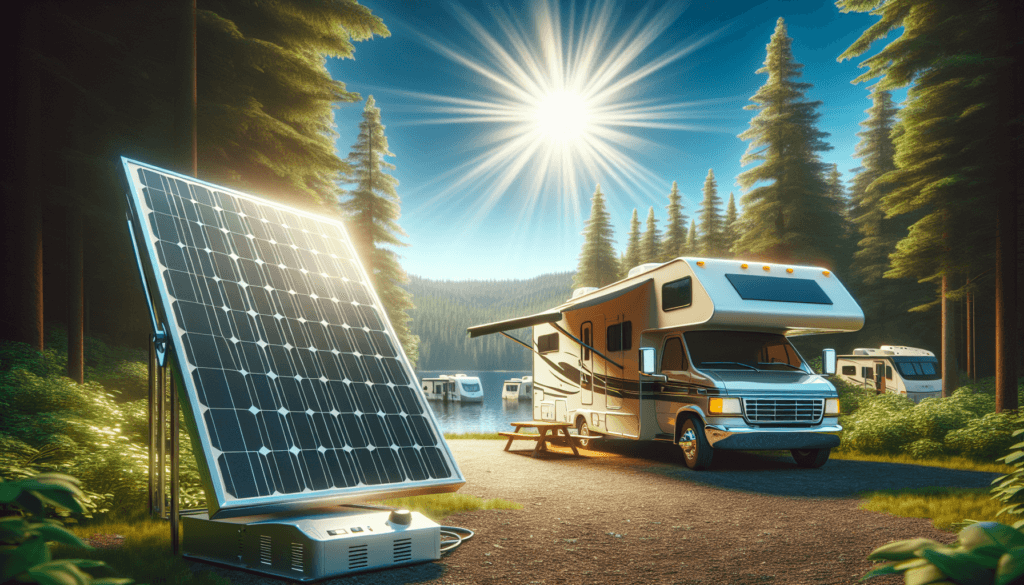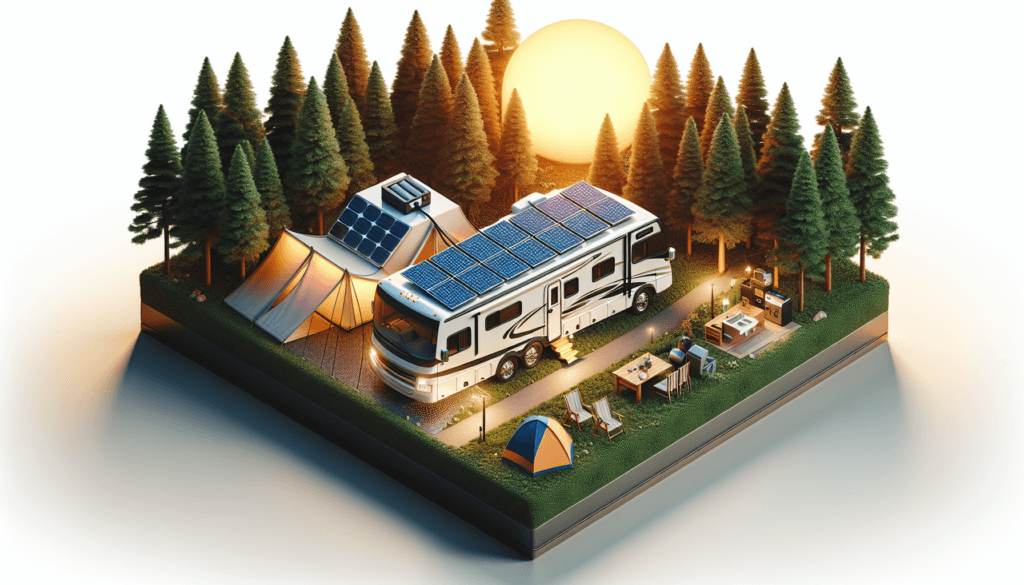Are you an avid camper who loves exploring the great outdoors in your RV? If so, then you need to know about the RV Camping Solar Generator. This innovative device is changing the way campers power their adventures by harnessing the energy of the sun. In this article, we will delve into the details of this incredible technology and arm you with all the knowledge you need for your next camping trip. Say goodbye to noisy, fuel-powered generators and hello to a more sustainable and efficient way of powering your RV. Get ready to embrace the power of the sun!
Benefits of Using an RV Camping Solar Generator
Environmentally friendly
Using an RV camping solar generator has a positive impact on the environment. Unlike traditional generators that rely on fossil fuels, solar generators use renewable energy from the sun. This means that they produce zero carbon emissions, reducing your carbon footprint and helping to combat climate change. By switching to solar power, you are taking a step towards a cleaner and greener future.
Cost-effective
Another major benefit of using an RV camping solar generator is that it can save you money in the long run. While the initial investment may be higher compared to traditional generators, solar generators have lower operating costs since sunlight is free. You won’t have to spend money on fuel or worry about rising fuel prices. Additionally, some campgrounds offer free or discounted rates for RVs with solar generators, further adding to the cost savings.
Quiet and low maintenance
One of the biggest irritations when camping is the noise generated by traditional generators. RV camping solar generators, on the other hand, operate silently, allowing you to enjoy the peace and tranquility of nature without any intrusive noise. Furthermore, solar generators have fewer moving parts, which means less maintenance and fewer chances of mechanical failures. This makes them a reliable and hassle-free power solution for your RV camping adventures.
Versatile and portable
RV camping solar generators are designed to be versatile and portable, making them suitable for all your outdoor adventures. They are compact and lightweight, allowing you to easily transport them from one location to another. Whether you’re camping in a remote area or traveling to different campgrounds, a solar generator can provide you with a consistent and reliable source of power. Additionally, many models come with built-in handles or wheels, making them even easier to move around.
Choosing the Right RV Camping Solar Generator
Power output
When choosing an RV camping solar generator, it’s important to consider its power output. Determine how much electrical power you typically require while camping and ensure that the generator can meet those needs. Consider the wattage of your appliances and devices and choose a generator with sufficient power to run them simultaneously. It’s always better to have a generator with a slightly higher power output to accommodate any future power needs.
Battery capacity
The battery capacity of an RV camping solar generator determines how long it can provide continuous power. Consider the size of the battery and the ampere-hour (Ah) rating. Higher Ah ratings indicate longer battery life. If you plan on using power-hungry devices or appliances during your camping trips, opt for a generator with a larger battery capacity to ensure that you don’t run out of power when you need it most.
Portability
Since you’ll be using your RV camping solar generator on the go, portability is a crucial factor to consider. Look for generators that are lightweight, compact, and easy to carry or transport. Some models even come with convenient carrying handles or wheels for easier maneuverability. Remember to also consider the size and weight of the solar panels, as they will need to be transported along with the generator.
Durability
Your RV camping solar generator should be able to withstand the rigors of outdoor use. Look for models that are constructed with durable materials and are designed to be resistant to dust, water, and extreme temperatures. Opt for generators with sturdy casings and reliable construction to ensure that they last for years to come. Additionally, check for warranties and customer reviews to get an idea of the product’s durability and the manufacturer’s reputation.

Preparing Your RV for Solar Generator Installation
Assess your power needs
Before installing an RV camping solar generator, it’s important to assess your power needs. Consider the appliances and devices you typically use while camping and estimate how much power they consume. This will help you determine the appropriate size and capacity of the solar generator you’ll need. Make a list of all the electrical equipment you plan to use and calculate their total power requirements to inform your decision.
Determine your roof space
Roof space plays a crucial role in determining the number of solar panels you can install on your RV. Measure the available roof space and consider any obstructions such as air conditioners or vents. This will help you determine the maximum number and size of solar panels that can be mounted on your RV. Ensure that the roof is structurally sound to support the weight of the panels and follow the manufacturer’s guidelines for installation.
Ensure proper ventilation
Proper ventilation is essential to prevent heat buildup and ensure the efficiency of your RV camping solar generator. Ensure that there is adequate airflow around the charging system and batteries. Install ventilation fans or vents if necessary to maintain optimal operating temperatures. This will help prolong the life of your generator and prevent any potential overheating issues.
Plan the wiring and connections
Before installing your RV camping solar generator, carefully plan the wiring and connections. Determine the best routing for the cables and take into account any potential obstacles or hazards. Ensure that the cables are properly sized and protected to handle the electrical load. Follow the manufacturer’s instructions for connecting the solar panels to the charge controller, the charge controller to the batteries, and the batteries to the inverter and outlets.
Installing Your RV Camping Solar Generator
Select the installation location
Choosing the right installation location for your RV camping solar generator is crucial for optimal performance. Ideally, the location should receive maximum sunlight exposure throughout the day. Clear any obstructions such as branches or other vehicles that may block the sunlight. Ensure that the location is safe and secure, especially if you plan to leave your RV unattended for extended periods of time.
Mounting the solar panels
Mounting the solar panels on your RV requires careful consideration. Follow the manufacturer’s instructions for securely mounting the panels on the roof or any other suitable surface. Use the appropriate brackets, screws, or adhesive to ensure a proper and stable installation. Make sure the panels are angled correctly to maximize sunlight absorption and efficiency.
Connecting the solar panels to the charge controller
Once the solar panels are securely mounted, it’s time to connect them to the charge controller. This device regulates the flow of electricity from the solar panels to the batteries. Follow the manufacturer’s instructions carefully to ensure proper wiring and connections. Double-check that the positive and negative terminals match and secure the cables tightly to prevent any loose connections.
Installing the charge controller and batteries
The charge controller and batteries are key components of your RV camping solar generator system. Find a suitable location within your RV to install them. Ensure that the area is well-ventilated and away from sources of heat or moisture. Mount the charge controller securely and connect it to the batteries following the manufacturer’s guidelines. Double-check all the connections and wiring to ensure a stable and reliable setup.
Wiring the inverter and outlets
The inverter is responsible for converting the DC power stored in the batteries into usable AC power for your appliances and devices. Install the inverter in a safe location, away from water or extreme temperatures, and connect it to the batteries using the appropriate cables. Run additional wiring from the inverter to the outlets where you’ll be plugging in your electrical equipment. Secure all the connections and cover them with appropriate protective materials.

Proper Maintenance and Care for Your RV Camping Solar Generator
Regularly clean the solar panels
To ensure optimal performance, it’s important to regularly clean the solar panels. Dust, dirt, and debris can accumulate on the surface and reduce the amount of sunlight absorbed. Use a soft cloth or brush and a mild cleaning solution to gently wipe away any dirt or grime. Be cautious not to scratch or damage the panels. Clean the panels at least once every few months or more frequently if you’re camping in dusty or dirty environments.
Check battery voltage and water levels
Regularly check the battery voltage and water levels to ensure that your RV camping solar generator is operating efficiently. Use a multimeter to measure the voltage and compare it to the manufacturer’s recommended range. If the voltage is outside the acceptable range, you may need to recharge or replace the batteries. For batteries that require maintenance, such as lead-acid batteries, periodically check and refill the water levels as needed.
Inspect and tighten electrical connections
Inspect and tighten all electrical connections regularly to prevent any loose or corroded connections. Over time, vibrations during travel or exposure to elements can loosen wires or terminals. Check all the wiring, cables, and terminals for any signs of wear or damage. Ensure that the connections are secure and tighten any loose screws or nuts. A loose connection can lead to inefficient power transfer and potentially damage your RV camping solar generator.
Monitor and maintain proper ventilation
Proper ventilation is crucial for the longevity and performance of your RV camping solar generator. Regularly inspect the ventilation fans or vents and ensure that they are free from dust, debris, or any obstructions. Make sure the airflow is unobstructed to prevent overheating and allow for the dissipation of excess heat. Clean or replace any clogged filters or fans to maintain optimal ventilation.
Using Your RV Camping Solar Generator
Understanding power usage and capacity
To make the most of your RV camping solar generator, it’s important to understand your power usage and capacity. Knowing how much power your appliances and devices consume will help you manage your energy usage efficiently. Monitor the power levels provided by your generator and plan your activities accordingly. If you’re nearing the generator’s capacity, consider using energy-saving appliances or devices or reducing your overall power usage.
Conserving energy when necessary
While RV camping solar generators provide a reliable source of power, it’s always a good idea to conserve energy whenever possible. This will help prolong the battery life and reduce the strain on your generator. Switch off lights and appliances when not in use, opt for energy-efficient devices, and consider natural alternatives like opening windows or using a manual fan instead of running the air conditioner. Being mindful of your energy consumption will ensure a longer-lasting power supply for your camping adventures.
Monitoring battery levels and recharging
Keep a close eye on your RV camping solar generator’s battery levels to avoid any unexpected power shortages. Many generators come with built-in battery monitors or indicators that display the current charge levels. Plan your activities and power usage accordingly to ensure that you don’t drain the batteries completely. When you have access to sunlight, take advantage of it to recharge your batteries and replenish their power levels.
Using appliances and devices efficiently
When using appliances and devices with your RV camping solar generator, it’s important to use them efficiently to maximize your available power. Opt for energy-saving modes or features whenever possible. For example, use the eco-mode on your TV or adjust the temperature settings on your refrigerator to reduce power consumption. Be mindful of your power usage and prioritize your essential devices, especially during times of limited sunlight or reduced battery capacity.

Troubleshooting Common Issues with RV Camping Solar Generators
Insufficient power generation
If your RV camping solar generator is not generating enough power, there could be several possible causes. Check the solar panels for any shading, dirt, or obstructions that may be preventing sunlight absorption. Ensure that the panels are properly angled towards the sun for maximum exposure. Verify the connections between the solar panels, charge controller, batteries, inverter, and outlets to ensure that they are secure and functioning correctly. If the issue persists, consult the manufacturer or a professional for further assistance.
Battery not charging or draining quickly
If your batteries are not charging or are draining quickly, there may be a problem with the charging system. Check the connections between the solar panels and the charge controller, as well as the connections between the charge controller and the batteries. Ensure that the cables are properly sized and that the positive and negative terminals are correctly matched. If the batteries are old or damaged, they may need to be replaced. Contact the manufacturer or a qualified technician for troubleshooting and repair.
Faulty wiring or connections
Faulty wiring or connections can cause various problems with your RV camping solar generator. Inspect all the wiring, cables, and terminals for signs of wear, damage, or loose connections. Tighten any loose screws or nuts and replace any damaged cables or connectors. If you’re unsure about your electrical skills, it’s best to consult a professional to ensure that the wiring is safe and correctly installed.
Inverter or appliances not functioning properly
If your inverter or appliances are not functioning properly, there may be an issue with the power output or compatibility. Check that the inverter is properly connected to the batteries and that the cables are secure. Ensure that the inverter is appropriate for the electrical requirements of your appliances and devices. If the problem persists, check the compatibility of your appliances with the type of power being produced by the inverter. Some sensitive electronics may require a pure sine wave inverter for optimal performance.
Safety Considerations for RV Camping Solar Generators
Proper grounding and electrical safety
When installing and using an RV camping solar generator, it’s important to follow proper grounding and electrical safety practices. Ensure that the generator is properly grounded to prevent electrical shocks and protect against lightning strikes. Use grounded outlets and extension cords to connect your appliances and devices. If you’re unsure about the electrical setup or grounding requirements, consult a professional electrician for assistance.
Protecting your solar panels from extreme weather
Extreme weather conditions such as heavy rain, hail, or snow can damage your solar panels. Ensure that your panels are securely mounted and check for any signs of wear or damage. If severe weather is expected, consider covering or protecting the panels to minimize the risk of damage. Regularly inspect and clean the panels to remove any debris that may hinder their performance.
Handling and storing batteries safely
Batteries can be potentially hazardous if mishandled or stored incorrectly. Follow the manufacturer’s instructions for proper handling and storage of the batteries. Avoid exposing the batteries to excessive heat or direct sunlight. Keep them in a cool, dry, and well-ventilated area, away from flammable materials. If the batteries are damaged, leaking, or swollen, take appropriate precautions and seek professional assistance for safe disposal.
Avoiding electrical overloads
To prevent electrical overloads, it’s important to understand the capacity and limitations of your RV camping solar generator. Avoid plugging in too many appliances or devices at once, especially power-hungry ones. Spread out your power usage throughout the day to prevent overloading the generator and draining the batteries too quickly. If you’re unsure about the electrical requirements of your appliances, consult their user manuals or contact the manufacturer for guidance.

Complying with RV Camping Solar Generator Regulations
Understanding local laws and regulations
Before installing or using an RV camping solar generator, it’s essential to understand the local laws and regulations that govern its operation. Different areas may have specific rules regarding the installation and usage of solar generators. Familiarize yourself with any permits, certifications, or inspections that may be required. Consult local authorities or renewable energy organizations for guidance on compliance with relevant laws and regulations.
Ensuring compliance with RV park rules
If you plan to use your RV camping solar generator in RV parks or campgrounds, ensure that you comply with their rules and guidelines. Some parks may have restrictions on noise levels, generator usage hours, or solar panel installations. Check with the park management or review their guidelines to avoid any conflicts or violations. Respect the environment and fellow campers by adhering to all park rules and regulations.
Obtaining necessary permits or certifications
Certain jurisdictions may require permits or certifications for the installation and use of RV camping solar generators. Research the local requirements and obtain the necessary permits or certifications as needed. This ensures that your installation is compliant with relevant regulations and helps protect your investment. Consult with local authorities or renewable energy professionals to ensure that you have all the necessary documentation.
Future Trends and Advances in RV Camping Solar Generators
Increased efficiency and power output
As technology continues to advance, RV camping solar generators are expected to become more efficient and capable of generating higher power output. Improvements in solar panel efficiency and energy storage systems will allow for greater power production and longer battery life. This will give RV campers even more freedom and flexibility when it comes to powering their adventures.
Advanced battery technologies
Battery technologies are constantly evolving, offering better energy storage solutions for RV camping solar generators. Advances in battery chemistry and design will lead to more efficient, longer-lasting batteries with shorter charging times. This means RV campers will be able to rely on their solar generators for extended periods without worrying about running out of power.
Integration with smart RV systems
With the rise of smart technology, RV camping solar generators are set to integrate seamlessly with smart RV systems. This integration will allow for improved monitoring and control of power usage, battery levels, and system performance. RV campers will have access to real-time data and will be able to adjust their power usage to maximize efficiency and extend battery life.
Wireless monitoring and control
Wireless monitoring and control capabilities are becoming increasingly popular in the world of RV camping solar generators. With wireless connectivity, you’ll be able to monitor and control your generator system remotely using your smartphone or other smart devices. This allows for convenient access to important information and the ability to make adjustments or troubleshoot issues without having to physically interact with the system.
In conclusion, the benefits of using an RV camping solar generator are numerous: they are environmentally friendly, cost-effective, quiet, low maintenance, versatile, and portable. Choosing the right generator involves considering factors such as power output, battery capacity, portability, and durability. Preparing your RV for solar generator installation requires assessing your power needs, determining roof space, ensuring proper ventilation, and planning the wiring and connections. Installing the solar generator involves selecting the installation location, mounting the solar panels, connecting the panels to the charge controller, installing the charge controller and batteries, and wiring the inverter and outlets. Proper maintenance and care involve regularly cleaning the solar panels, checking battery voltage and water levels, inspecting and tightening electrical connections, and monitoring and maintaining proper ventilation. When using your RV camping solar generator, it’s important to understand power usage and capacity, conserve energy when necessary, monitor battery levels and recharge as needed, and use appliances and devices efficiently. Troubleshooting common issues may involve addressing insufficient power generation, battery charging or draining problems, faulty wiring or connections, or inverter and appliance malfunctions. Safety considerations include proper grounding and electrical safety, protecting solar panels from extreme weather, handling and storing batteries safely, and avoiding electrical overloads. Complying with regulations involves understanding local laws and regulations, ensuring compliance with RV park rules, and obtaining necessary permits or certifications. The future of RV camping solar generators includes increased efficiency and power output, advanced battery technologies, integration with smart RV systems, and wireless monitoring and control. With these considerations in mind, RV camping solar generators provide a sustainable and reliable power solution for your outdoor adventures.



